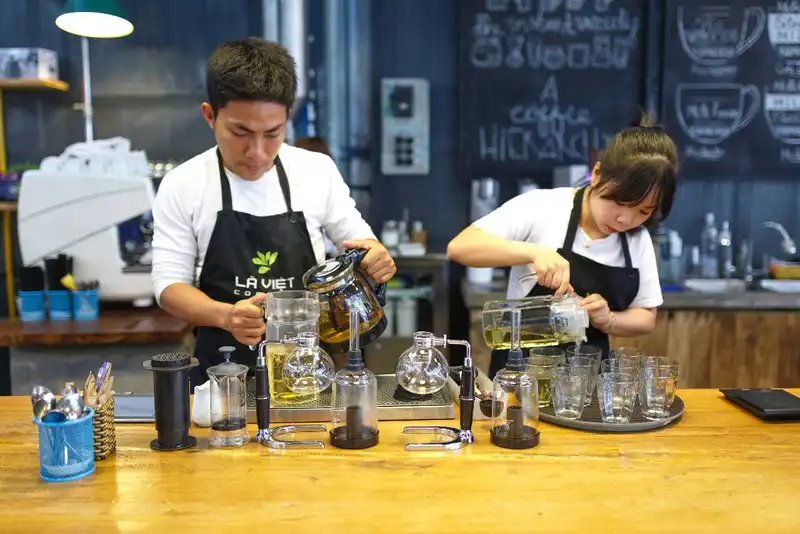What is food safety training?
Food safety training educates individuals on handling, storing, and preparing food to prevent foodborne illnesses, ensuring adherence to hygiene standards and regulations for public health and safety.
Top 7 Food Safety Trainings for Restaurants
Food Safety Courses
Food safety is a critical aspect of the culinary and hospitality industries, profoundly impacting public health and business reputations. In our increasingly globalized food system, where ingredients travel across the world, ensuring the safety of what we eat has never been more important. Foodborne illnesses, caused by bacteria, viruses, parasites, or chemical substances, can lead to severe health issues ranging from digestive disturbances to life-threatening conditions. This underscores the necessity of comprehensive food safety training.
The introduction of stringent food safety regulations globally has further elevated the importance of this training. It's not only a requirement for compliance but also a crucial component of public health strategy. Food safety training equips individuals and businesses with the knowledge and skills to handle, prepare, and store food safely, thereby reducing the risk of foodborne illnesses.
Diverse types of food safety courses are available, catering to different needs and sectors within the food industry. These courses range from basic training, designed for new entrants into the food service sector, to advanced courses aimed at food safety professionals. Some courses focus on general principles applicable across the board, while others are specialized, targeting specific areas such as restaurant management, food processing, or even specific types of cuisine.
For restaurants, which are often hotspots for food safety breaches due to high customer volume and rapid food turnover, specialized courses are available. These courses cover areas like proper cooking techniques, cross-contamination prevention, and correct storage practices. There are also courses that focus on the management aspect of food safety, teaching how to develop and implement effective food safety management systems within an organization.
The emergence of online training platforms has made these courses more accessible. From interactive webinars to comprehensive online modules, these platforms offer flexibility for professionals to upgrade their skills without disrupting their work schedules. The courses are also frequently updated to keep pace with changing regulations and emerging challenges in food safety.
Criteria for Selection

When selecting the top food safety training courses, several critical criteria are considered to ensure that the courses not only meet industry standards but also provide comprehensive, practical knowledge. These criteria play a pivotal role in guiding both individuals and organizations towards making informed decisions about their food safety education and training needs.
Accreditation
One of the primary factors in selecting these courses is their accreditation status. Accreditation by recognized bodies ensures that the course meets specific quality standards set by food safety experts and regulatory authorities. This is crucial as it guarantees that the training is rigorous, up-to-date, and in compliance with national and international food safety laws and guidelines. Accredited courses are more likely to be recognized and respected by employers, regulatory agencies, and peers within the industry.
Course Content
The content of the course is another vital criterion. It must comprehensively cover all essential aspects of food safety, from basic practices like hand hygiene and cross-contamination prevention to more complex topics such as HACCP (Hazard Analysis and Critical Control Points) principles, allergen management, and emergency response procedures. The course should be well-structured, covering both theoretical knowledge and practical applications. It's important that the course stays current with the latest developments in food safety, incorporating new research findings, emerging risks, and changes in regulations.
Relevance
The relevance of the course to the specific needs of the learner or the organization is also a key factor. Courses should be relevant to the specific sector of the food industry that the learner is involved in, whether it's catering, retail, manufacturing, or restaurant management. This ensures that the training is not just generic but tailored to address the unique challenges and requirements of different food operations.
User Reviews
Lastly, user reviews and feedback play a significant role in the selection process. Reviews from past participants provide insights into the effectiveness of the course, the quality of the training material, and the competency of the instructors. Positive reviews, especially from well-known industry professionals, can be a strong indicator of a course's value and effectiveness.
When selecting the top food safety training courses, it is essential to consider accreditation, course content, relevance to the industry, and user reviews. These criteria help in identifying courses that are not only informative and compliant with standards but also practical and highly regarded by professionals in the field. This meticulous selection process ensures that individuals and businesses gain the most valuable and applicable knowledge to uphold the highest standards of food safety.
Create, Implement, and Execute Multiple Daily Checklists
Streamline Your Operations with Altametrics
Course 1. Basic Food Safety Training
Course 1 in our selection of top food safety courses is basic food safety training. This course is foundational, designed to introduce participants to the fundamental concepts and practices essential for ensuring food safety. It's an indispensable starting point for anyone entering the food industry or looking to refresh their knowledge.
Course Content and Objectives
The basic food safety training course covers a wide array of topics critical to understanding and implementing food safety practices. The curriculum typically includes understanding foodborne illnesses their causes, how they are transmitted, and prevention methods. Participants learn about personal hygiene practices, such as proper handwashing techniques, which are essential in preventing the spread of contaminants. The course also delves into safe food handling procedures, including correct cooking temperatures, cooling, reheating, and storing food. Another critical area covered is cleaning and sanitizing, teaching participants how to effectively maintain a hygienic kitchen environment. A significant component of the course also involves an introduction to food safety management, where participants learn about the basic principles and practices of managing food safety in a commercial setting. By the end of the course, participants should have a solid understanding of the basics of food safety and be well-equipped to apply these principles in their workplace.
Target Audience and Prerequisites
This course is targeted primarily at entry-level employees in the food industry, such as kitchen staff, servers, and food handlers in various settings, including restaurants, cafes, and food manufacturing. It's also suitable for individuals looking to enter the food service industry or those seeking a basic certification in food safety. There are generally no prerequisites for this course, making it accessible to anyone with an interest in food safety.
Course Duration, Cost, and Certification Details
The duration of basic food safety training courses can vary, but they typically range from a few hours to a full day. This makes the course convenient for busy professionals or those currently employed in the food industry. The cost of the course is usually quite reasonable, reflecting its introductory nature. Upon successful completion of the course, participants often receive a certificate, which can be a valuable addition to a professional resume, demonstrating commitment to maintaining food safety standards. Some regions may require this certification for employment in certain food-related roles.
The Basic food safety training Course is a comprehensive introduction to the essentials of food safety. It provides a strong foundation for anyone starting in the food industry or seeking to ensure their practices meet health and safety standards. The course's focus on fundamental principles, along with its practical approach to food safety management, makes it an invaluable starting point for a career in food service and production.
Course 2. Advanced Food Safety Certification
Course 2, titled "advanced food safety certification," is a step up from basic training, offering an in-depth exploration of food safety principles and practices. This course is designed for those who already have a foundational understanding of food safety and are looking to deepen their knowledge and skills, potentially taking on more responsibility in their professional roles.
Course Curriculum
The curriculum of the advanced food safety certification course delves deeper into the complexities of food safety management. It typically covers advanced topics such as the development and implementation of food safety management systems, detailed analysis of Hazard Analysis and Critical Control Points (HACCP) principles, and an in-depth look at current food safety legislation and compliance requirements. The course also often includes modules on managing food safety risks in supply chains, advanced techniques for controlling physical, chemical, and biological hazards, and strategies for effective training and leadership in food safety within an organization. The course is designed to not only impart theoretical knowledge but also to develop practical skills in managing food safety in a variety of settings.
Target Audience and Benefits
This course is ideal for individuals already working in the food industry who are looking to advance their careers. It is particularly beneficial for kitchen managers, head chefs, food safety officers, and quality assurance personnel. By achieving certification in food safety at an advanced level, these professionals can enhance their ability to manage complex food safety systems, ensure compliance with regulatory standards, and lead food safety initiatives in their workplaces. This certification can lead to higher-level positions within the industry, increased job security, and the potential for a higher salary.
Duration, Cost, and Certification Process
The duration of the Advanced food safety certification course can vary, but it generally spans several days to a few weeks, depending on the intensity and format of the program. The cost reflects the advanced nature of the course and the depth of knowledge provided. Upon completion of the course, participants undergo an assessment, which may include examinations, practical evaluations, or project submissions. Successful completion of these assessments leads to the award of the Advanced food safety certification, a recognized credential that signifies a high level of expertise in food safety practices and management.
The Advanced food safety certification course offers a comprehensive and detailed exploration of food safety. It is an invaluable educational step for food industry professionals seeking to elevate their expertise and take on more significant roles in food safety management within their organizations. The certification gained upon completion of this course is a testament to an individual's advanced skills and knowledge in the field, opening doors to enhanced career opportunities.
Course 3. Food Safety for Restaurants

Course 3, titled "Food Safety for Restaurants," is a specialized training program focusing explicitly on the unique food safety challenges and requirements within the restaurant industry. This course is tailored to address the specific conditions and risks associated with restaurant operations, providing comprehensive knowledge and practical skills essential for maintaining high standards of food safety in these settings.
Overview of the Course
The "Food Safety for Restaurants" course covers a broad range of topics tailored to the restaurant environment. Key areas of focus include identifying and managing common foodborne pathogens that are particularly relevant to restaurant menus, implementing effective cross-contamination prevention strategies, and maintaining optimal food storage conditions. The course also delves into restaurant-specific topics like managing busy kitchen workflows while ensuring food safety, understanding and complying with restaurant food safety regulations, and responding effectively to food safety emergencies, such as outbreaks of foodborne illness. Additionally, participants learn about customer communication regarding food safety, including handling allergens and special dietary requirements.
Target Audience
This course is ideal for a wide range of professionals within the restaurant industry, including restaurant owners, managers, chefs, kitchen staff, and front-of-house staff. It is equally beneficial for new entrants to the industry and seasoned professionals seeking to update their knowledge and skills in line with current best practices.
Course Specifics
The duration of the "Food Safety for Restaurants" course typically ranges from a few hours to several days, depending on the depth of content and the mode of delivery (online or in-person). The fees are generally structured to be affordable for individual professionals and scalable for group training for restaurant staff. Upon completion of the course, participants usually undergo an assessment to test their understanding of the material. Successful completion of this assessment leads to a certification, acknowledging the individual's proficiency in restaurants food safety practices. This certification can be a significant asset, enhancing the credibility of the professional and the establishment they represent.
The "Food Safety for Restaurants" course is an essential educational tool for anyone involved in the restaurant industry. It provides targeted, practical knowledge and skills crucial for managing the unique food safety challenges in restaurant settings. The course equips professionals with the ability to implement effective food safety practices, ensuring the wellbeing of customers and the reputation of the establishment.
Effortlessly Create, Implement, and Execute Multiple Daily Checklists
Optimize Your Daily Operations with Altametrics
Course 4. 5, 6. Specialized Food Safety Courses
Courses 4, 5, and 6 in our lineup of top food safety courses offer specialized training tailored to specific needs and sectors within the food industry. These courses - HACCP Certification, Allergen Management, and Food Safety for Retail - each address critical and distinct aspects of food safety, catering to a diverse range of professionals.
HACCP Certification
The Hazard Analysis and Critical Control Points (HACCP) certification course is an in-depth program focusing on a systematic preventive approach to food safety. It's designed for professionals involved in food production, processing, and handling. The course covers the seven principles of HACCP, teaching participants how to identify, evaluate, and control food safety hazards in their operations. The curriculum also includes the development and implementation of an effective food safety programs based on HACCP principles. The duration of this course varies, typically ranging from one to several days. Upon completion, participants receive HACCP certification, acknowledging their ability to effectively manage food safety risks using this internationally recognized system.
Allergen Management
With the increasing prevalence of food allergies, the Allergen Management course is becoming increasingly crucial. This course is designed for food service professionals, including chefs, kitchen managers, and food product developers. It focuses on identifying common allergens, cross-contamination prevention, and creating allergen-free menus. The course also covers legal requirements related to allergen labeling and communication strategies for effectively informing customers about allergen content. This course typically lasts a few hours to a day and culminates in a certification that recognizes the participant's expertise in allergen management within food service environments.
Food Safety for Retail
This course is tailored for professionals working in food retail, such as supermarkets, grocery stores, and food markets. It covers specific challenges faced in the retail sector, including product handling, storage, and display to ensure food safety. The curriculum emphasizes the importance of maintaining the cold chain, managing shelf life, and implementing effective cleaning and sanitation practices. Participants also learn about developing and maintaining a comprehensive food safety program tailored to retail settings. The course duration is usually a day or two, and successful participants receive certification, demonstrating their proficiency in maintaining food safety standards in retail environments.
These specialized courses - HACCP Certification, Allergen Management, and Food Safety for Retail - offer focused training on key areas of food safety. They provide participants with the skills and knowledge to develop and implement effective food safety programs in various settings, enhancing the safety, quality, and integrity of food products across the industry.
Benefits of Food Safety Education
The benefits of food safety education extend far beyond the immediate confines of the kitchen or dining room. By undertaking food safety courses, individuals and businesses tap into a range of advantages that influence public health, regulatory compliance, and personal career development. Understanding and appreciating the importance of food safety is crucial in today's increasingly health-conscious and regulated world.
Impact on Public Health
First and foremost, food safety education plays a pivotal role in safeguarding public health. Foodborne illnesses, which can result from improper handling, storage, or preparation of food, are a significant public health concern globally. By educating food handlers and managers about safe food practices, the risk of foodborne diseases is substantially reduced. This education equips professionals with the knowledge to prevent cross-contamination, understand the correct cooking temperatures for different foods, and implement effective cleaning and sanitization protocols. The result is a safer food supply chain and a healthier public.
Business Compliance
Another critical benefit of food safety education is ensuring compliance with local and international food safety regulations. These regulations are continually evolving, and staying informed through continuous education is vital for any food-related business. Compliance is not just about avoiding penalties or legal issues; it also enhances a business's reputation. Consumers are increasingly aware and concerned about food safety, and businesses that prioritize this aspect are likely to gain customer trust and loyalty.
Personal Career Growth
For individuals, food safety education can be a significant catalyst for career growth. In the food industry, where competition is fierce, having formal certifications in food safety can set a professional apart. It demonstrates a commitment to quality and safety, which are highly valued traits in this industry. For those aspiring to move into managerial roles, advanced food safety courses provide the necessary knowledge and skills to oversee comprehensive food safety programs and lead teams effectively. This expertise not only opens up new career opportunities but also contributes to personal satisfaction and professional confidence.
The benefits of food safety education are multifaceted, impacting public health, business operations, and individual career trajectories. By understanding and implementing the principles learned in these courses, professionals contribute significantly to a culture of safety and quality in the food industry, ultimately benefiting society as a whole. The importance of food safety cannot be overstated, and education in this field is a key component in maintaining high standards across the board.
Key Points
The exploration of the top seven food safety courses offers a comprehensive overview of the various educational pathways available for those seeking to enhance their knowledge and skills in food safety. From the foundational Basic Food Safety Training to the more specialized courses like HACCP Certification, Allergen Management, and Food Safety for Retail, each program caters to different aspects and requirements of food safety, emphasizing the importance of this field in protecting public health, ensuring business compliance, and fostering personal career growth.
The Basic Food Safety Training course lays the groundwork for understanding the fundamental principles of food safety, making it an ideal starting point for new entrants to the food industry. For those looking to delve deeper into the subject, the Advanced Food Safety Certification provides a more detailed and comprehensive study. The specialized courses HACCP Certification, Allergen Management, and Food Safety for Retail address specific needs and challenges in the food industry, offering targeted solutions and practices.
Furthermore, the importance of food safety education in safeguarding public health cannot be overstated. It is crucial for preventing foodborne illnesses and ensuring a safer food supply chain. For businesses, adhering to food safety standards is not only a regulatory requirement but also a way to build trust and loyalty among consumers. On a personal level, acquiring certifications in food safety can significantly enhance career prospects, setting individuals apart in a competitive industry.
For those interested in enrolling in these courses or seeking more information, several steps can be taken. Firstly, research accredited institutions or organizations that offer these courses. Many courses are available through culinary schools, community colleges, and professional culinary associations. Online platforms also offer a variety of food safety courses, providing flexibility for those who cannot attend in-person classes. Additionally, potential enrollees should contact the institutions directly for detailed information about course content, duration, fees, and the enrollment process. It's also beneficial to consult with industry professionals or peers who have completed these courses for recommendations and insights.
Incorporating tools like Altametrics into food safety training enhances its practical application. Altametrics offers easy-to-use checklists, aiding in the seamless translation of theoretical knowledge into daily operations. Its efficient task management capabilities improve compliance with food safety standards, reduce the risk of foodborne illness, and increase overall operational efficiency. For individuals, proficiency in utilizing Altametrics signifies a commitment to high food safety standards, enhancing their professional value. This tool bridges the gap between education and real-world application, reinforcing food safety practices regularly and embedding them into organizational culture, thus amplifying the impact and efficacy of food safety training.
Take Control of Your Operations Team's Tasks
Discover Seamless Workflow Management with Altametrics












